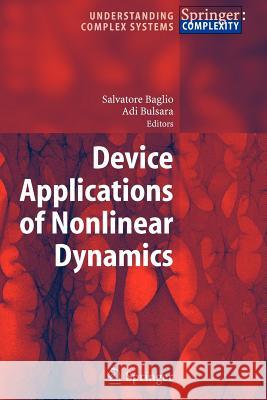Device Applications of Nonlinear Dynamics » książka
Device Applications of Nonlinear Dynamics
ISBN-13: 9783642070440 / Angielski / Miękka / 2010 / 241 str.
The past two decades have witnessed an explosion of ideas in the general ?eld of nonlinear dynamics. In fact, it has become increasingly clear that areas as diverse as signal processing, lasers, molecular motors, and biomedical anomalies have a c- mon underlying thread: the dynamics that underpin these systems are inh- ently nonlinear. Yet, while there has been signi?cant progress in the theory of nonlinear phenomena under an assortment of system boundary conditions andpreparations, thereexistcomparativelyfewdevicesthatactuallytakethis rich behavior into account. In the presence of background noise (a given, for most practical appli- tions), the underlying dynamic phenomena become even richer, with the noise actually mediating cooperative behavior that, when properly understood, can lead to signi?cant performance enhancements; a striking example of this - havior occurs, for example, when the underlying dynamics undergoes a bif- cation from static to oscillating behavior when a control parameter is swept through a critical value. If properly understood, theoretically, the (suitably quanti?ed) system response can be signi?cantly enhanced near the onset of the bifurcation. Examples of this behavior have been observed in a large n- ber of laboratory experiments on systems ranging from solid state lasers, to SQUIDs, and such behavior has been hypothesized to account for some of the more striking information processing properties of biological neurons. In many cases, background noise can precipitate this behavior, thereby playing a signi?cant role in the optimization of the response of these systems to small external perturbations











